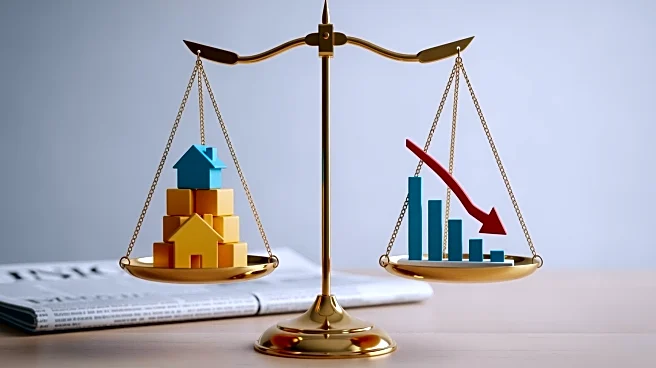What's Happening?
Recent actions by the Federal Reserve, including back-to-back 25-basis-point rate cuts in September and October, have resulted in a decrease in mortgage rates. This development is particularly significant
for borrowers seeking large loans, such as a $700,000 mortgage. The average rate for a 30-year fixed mortgage has dropped to 6.17%, down from 7.04% in January 2025. Similarly, the rate for a 15-year fixed mortgage has decreased to 5.41%. These reductions translate into substantial monthly savings for borrowers. For instance, a 30-year fixed mortgage at the current rate results in a monthly payment of $4,273.67, while a 15-year fixed mortgage requires a monthly payment of $5,686.21. These figures do not include additional costs such as property taxes and insurance, which can further impact monthly expenses.
Why It's Important?
The reduction in mortgage rates is significant for the housing market, particularly in competitive areas where high loan amounts are common. Lower rates mean reduced monthly payments, making homeownership more accessible to a broader range of buyers. This can stimulate the real estate market and potentially lead to increased home sales. Additionally, homeowners with existing mortgages at higher rates may find refinancing attractive, offering them the opportunity to lower their monthly payments and save money over the life of their loans. The rate cuts by the Federal Reserve are a strategic move to ease financial burdens and encourage economic activity.
What's Next?
As mortgage rates continue to fluctuate, potential homebuyers and current homeowners may consider refinancing or securing new loans to take advantage of the lower rates. It is advisable for borrowers to shop around and compare offers from multiple lenders to ensure they receive the best possible rate. The Federal Reserve's future actions regarding interest rates will be closely monitored, as they will influence mortgage rates and the broader economic landscape. Stakeholders in the housing market, including real estate agents and financial institutions, will likely adjust their strategies in response to these changes.
Beyond the Headlines
The decrease in mortgage rates may have broader implications for the U.S. economy. Lower borrowing costs can lead to increased consumer spending and investment, contributing to economic growth. However, there are potential risks, such as the possibility of inflation if rates remain low for an extended period. Additionally, while lower rates benefit borrowers, they can impact savers and investors who rely on interest income. The Federal Reserve must balance these factors as it navigates economic policy.










